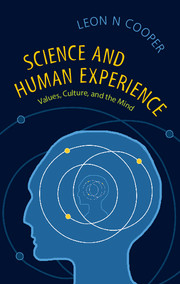Book contents
- Frontmatter
- Dedication
- Contents
- Preface
- Acknowledgement
- Part One Science and Society
- 1 Science and Human Experience: (Mephistopheles Is Alive and Well and Living in the Space Age)
- 2 Does Science Undermine our Values?
- 3 Can Science Serve Mankind?
- 4 Modern Science and Contemporary Discomfort: Metaphor and Reality
- 5 Faith and Science
- 6 Art and Science
- 7 Fraud in Science
- 8 Why Study Science? The Keys to the Cathedral
- 9 Is Evolution a Theory? A Modest Proposal
- 10 The Silence of the Second
- 11 Introduction to Copenhagen
- 12 The Unpaid Debt
- Part Two Thought and Consciousness
- Part Three On the Nature and Limits of Science
- References
1 - Science and Human Experience: (Mephistopheles Is Alive and Well and Living in the Space Age)
from Part One - Science and Society
Published online by Cambridge University Press: 05 November 2014
- Frontmatter
- Dedication
- Contents
- Preface
- Acknowledgement
- Part One Science and Society
- 1 Science and Human Experience: (Mephistopheles Is Alive and Well and Living in the Space Age)
- 2 Does Science Undermine our Values?
- 3 Can Science Serve Mankind?
- 4 Modern Science and Contemporary Discomfort: Metaphor and Reality
- 5 Faith and Science
- 6 Art and Science
- 7 Fraud in Science
- 8 Why Study Science? The Keys to the Cathedral
- 9 Is Evolution a Theory? A Modest Proposal
- 10 The Silence of the Second
- 11 Introduction to Copenhagen
- 12 The Unpaid Debt
- Part Two Thought and Consciousness
- Part Three On the Nature and Limits of Science
- References
Summary
One does not often find written today “The great object of science is to ameliorate the condition of man, by adding to the advantages which he naturally possesses.” Has science failed us? If so, how?
This essay is based on a talk given for the Third Tykociner Memorial Lecture at the University of Illinois, Urbana, in 1976. The lecture series, named in honor of Joseph Tykociner, focuses on the relationship between science and art.
1
Professor Tykociner was concerned with what is common to the arts and the sciences as well as the interplay between these very different areas, a subject that has always intrigued me. Whether what is common is more important than what is obviously different will probably be argued about for ever. However, the sharp distinction between the sciences and the arts that has been recently much talked about may not be that well posed. We might as well ask, considering the vastly different techniques employed, whether what the musician, painter, and playwright have in common is more important than where they differ.
I believe that there does exist a deep commonality of purpose among the arts and the sciences. But you will have to decide for yourselves whether this is significant enough – considering their many differences – to be worth emphasizing.
- Type
- Chapter
- Information
- Science and Human ExperienceValues, Culture, and the Mind, pp. 3 - 23Publisher: Cambridge University PressPrint publication year: 2014



